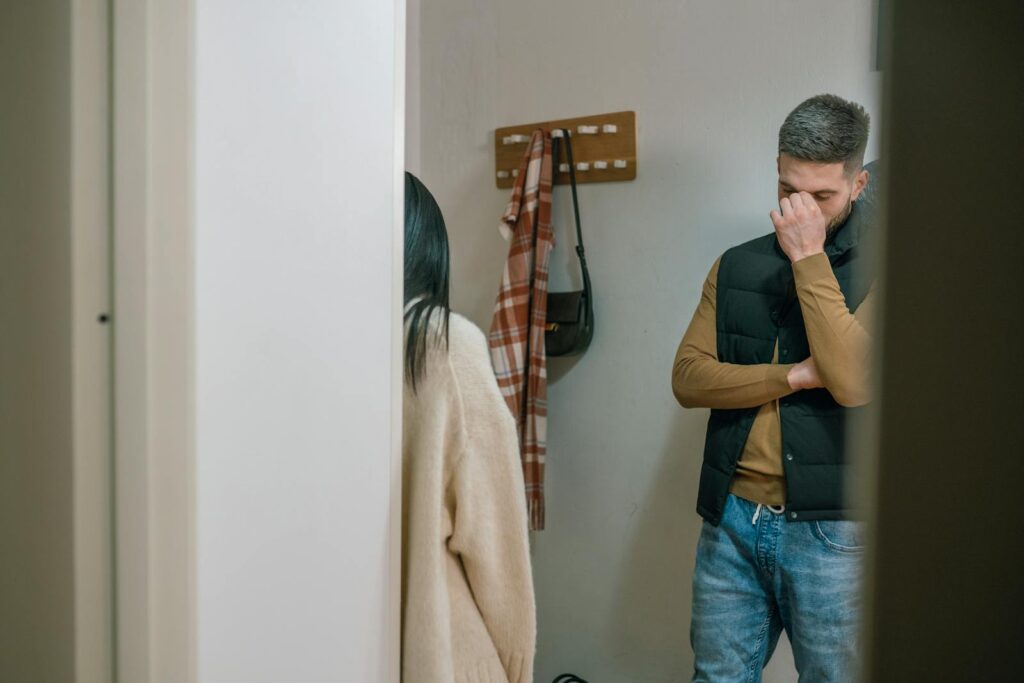
You can usually tell when someone’s fighting with who they are, even if they hide it well. It’s in the way they overthink small things or laugh too quickly when something stings. They seem fine—maybe even confident—but something about them feels tense, like they’re always trying to stay one step ahead of judgment. It’s not arrogance or moodiness. It’s the quiet exhaustion of never feeling fully okay in their own skin.
They Overexplain Everything

Every small decision comes with an explanation. They tell you why they canceled, why they picked that shirt, and why their text sounded off. It’s not about excuses—it’s about fear of being misunderstood. They need people to know they meant well. The overexplaining becomes automatic, like a nervous tic. After a while, even honest answers sound rehearsed. They don’t realize most people stopped questioning them long ago—they’re the only ones still doing it.
They Joke About Themselves Too Much

They turn self-criticism into comedy. It makes everyone laugh, and for a second, they feel in control of their own flaws. But later, when the room quiets down, those same words echo differently. The joke wasn’t funny to them—it was familiar. It’s safer to laugh first than risk someone else pointing out what you already dislike. The humor feels like armor, but it’s built from the same things that keep them hurting.
They Avoid Looking at Themselves

Some people can’t face their own reflection. They walk past mirrors without glancing or dimming the lights as they get ready. It’s not vanity—it’s discomfort. Staring back are reminders of every failure, every flaw they’ve replayed a hundred times. After a while, they stop seeing a face and start seeing a list of what’s wrong. So they avoid mirrors, pretending it’s indifference, when really, it’s a quiet truce with the parts they can’t forgive.
They Downplay Compliments

When someone says something kind, they almost freeze. It doesn’t fit how they see themselves, so they dismiss it. They call it luck or timing and move on. It’s not modesty—it’s disbelief. They’ve learned to treat praise like a misunderstanding that needs correcting. After a while, people stop trying. The silence that follows hurts more than the words ever did. What they wanted wasn’t approval; it was just the ability to accept it.
They Chase People Who Don’t Want Them

They go after the ones who pull away. It’s not because they enjoy the pain; it’s because they’ve grown used to earning affection that never comes easily. The chase feels familiar. When someone finally wants them, they don’t trust it—it feels unearned, suspicious. They confuse longing with love and find comfort in almosts. It’s easier to stay in the ache than risk being loved by someone who might see how unsure they are.
They Compare Constantly

They don’t mean to, but it happens. One scroll turns into twenty. Someone’s trip, someone’s promotion, someone’s smile that looks real. Their own life starts to feel smaller in comparison. It’s not jealousy—it’s exhaustion from never feeling caught up. Even the good moments lose their color when they’re always measured against someone else’s. They don’t realize how much it’s stealing until the habit feels normal and the joy feels borrowed.
They Apologize for Existing

Sorry slips out before they even think. Someone bumps into them, and they’re the ones saying it. They apologize for taking too long, for speaking up. It’s not manners—it’s a habit. Years of trying to stay small have led them to believe that politeness means fading into the background. Most people don’t notice it anymore, and that’s the sad part. The world has grown accustomed to their shrinking. They’ve turned self-erasure into something that sounds polite.
They Overwork to Feel Worthy

They equate exhaustion with value. When they’re not doing something, guilt creeps in. So they keep moving—emails at midnight, endless to-do lists, constant motion. Work becomes a shield against the thought that they’re not enough on their own. The moment they stop, silence floods in, and it’s unbearable. Productivity gives them temporary relief. It’s not pride; it’s escape. Rest doesn’t feel safe when your worth depends on proof.
They Struggle to Set Boundaries

They agree before they’ve even processed the question. A part of them panics at the thought of saying no. So they end up overcommitted, smiling through things they don’t have the energy for. When resentment hits, they call it exhaustion. Deep down, it’s fear—fear that refusing someone will cost affection. They’re kind, but it’s the kind that hurts. The kind that gives everything until nothing feels like theirs anymore.
They Hide Behind Perfection

They try to make everything look right. Not because they want praise, but because being flawless feels safe. One mistake feels like proof that something inside is broken. So they fix, plan, and overdo until nothing feels natural anymore. When something small goes wrong, it has a disproportionate impact. They’re not proud of the act—it’s just the only way they know to stay in control.
They Stay in One-Sided Relationships

They give endlessly and call it love. Patience, forgiveness, another chance—again and again. The other person rarely meets them halfway, but they stay. They tell themselves it’s loyalty, not fear. Truth is, walking away feels like admitting they deserved better all along. They’ve learned to settle for the smallest gestures and call it enough. What they really want is someone who gives freely, not someone they have to convince to care.
They Avoid Silence

They fill every quiet moment—music, TV, background chatter. Silence feels dangerous because that’s when the thoughts get loud. In noise, they can pretend everything’s fine. In stillness, the truth presses close: the loneliness, the doubt, the self-criticism they’ve been drowning out. So they stay busy, even at home. Anything’s better than facing what the quiet might say about who they’ve become.
They Seek Validation in Numbers

They scroll without thinking. A few likes or replies make them feel lighter for a moment. Then the emptiness comes back. It’s not about attention. It’s about feeling like they still matter. The habit grows quiet but constant. Even when they try to stop, their hand still reaches for the phone. Numbers give them comfort, but it never lasts long enough to mean anything.
They Push Away Good People

When someone treats them well, it makes them uneasy. They wait for the moment it turns, for kindness to become a setup. They test people without realizing it—go silent, pull back, watch who stays. It’s not manipulation; it’s fear. They’ve learned that love hurts, so when it doesn’t, they get suspicious. Pushing away becomes a strange way of feeling safe, even when it leaves them lonelier than before.
They Struggle to Rest

They can’t relax because they’ve tied worth to being productive. Stillness feels like losing ground. So they keep their hands busy—folding clothes that don’t need to be folded, checking messages that aren’t there. What they call discipline is, in reality, fear. They don’t know how to stop proving themselves, even when no one’s watching.

